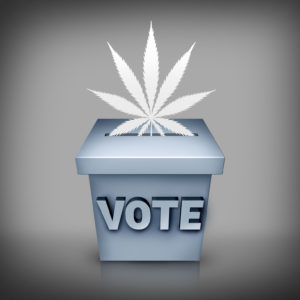Millions of Americans will go to the polls this November and cast votes on whether or not to legalize the use of marijuana in their states.
If past is precedent, most — if not all — of these statewide ballot measures will be enacted into law.
Currently, 33 states and the District of Columbia have laws on the books regulating the production and dispensing of medical cannabis to qualified patients. About half of these measures were passed by voters at the ballot box.
Eleven states — comprising about 25 percent of the U.S. population — have legalized the possession and use of marijuana by anyone over the age of 21. In nine of those states, these adult-use measures were enacted by a direct vote of people.
This history of success should hardly be surprising.
According to nationwide polling data compiled by Gallup, two-thirds of Americans — including majorities of Democrats, Republicans and independents — believe that marijuana consumption by adults ought to be legal in the United States.
On the issue of legalizing cannabis for medical use, support is even stronger. National polling data compiled by Quinnipiac University found that 91 percent of voters believe that adults should be able to access and use medical marijuana when it is authorized by their physician.
Yet, despite this public consensus, elected officials have largely remained unresponsive to the legalization issue; rarely are they willing to expend the political capital necessary to advance the issue legislatively, particularly with respect to legalizing the adult-use marijuana market.
This dereliction of duty has forced advocacy groups to place the marijuana-related ballot question directly before the voters — something they have done successfully in every election dating back to 1996, when Californians became the first to legalize medical cannabis at the ballot box.
Tellingly, voters’ have yet to express any buyers’ remorse following their decisions. According to available polls, voters residing in jurisdictions where cannabis is legal consistently report that legalization has been a “success” in their state, and that the regulated marijuana market is preferable to criminalization.
In many of those states that initially legalized cannabis for medical purposes only, voters later on decided in favor of expanding these regulatory schemes to include all adults.
Notably, even elected officials have largely learned to live with, and ultimately, respect the voters’ wishes. To date, no state that has legalized cannabis for either therapeutic or for adult-use purposes has ever repealed their law.
Rather, state politicians have generally taken steps following these laws’ enactment to expand the public’s access to the legal cannabis market.
This election, voters in four additional states — Arizona, Montana, New Jersey and South Dakota — will weigh in on the question of whether to legalize marijuana use and sales for adults, while two states — Mississippi and South Dakota — will decide on the issue of medical use.
In each of these states, initial polls show solid support among voters for these ballot measures – despite, in some cases, the expressed opposition of those in positions of political leadership.
Of course, voters have been consistently defying their elected officials on this issue for over two decades now and, no doubt, most will do so again in November. Ideally, though, these ballot campaign efforts should no longer be necessary.
The public have spoken loudly and clearly: they favor jettisoning the failed policies of marijuana prohibition and replacing it with a policy of legalization, regulation, taxation and public education.
Their elected officials ought to be listening.

